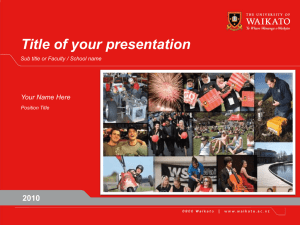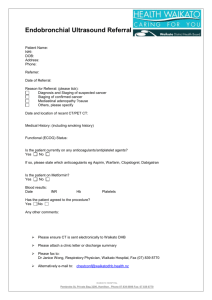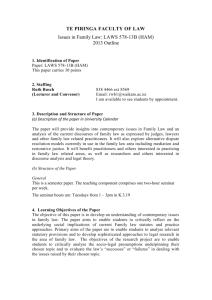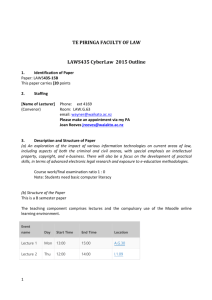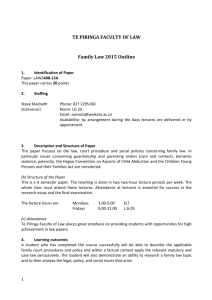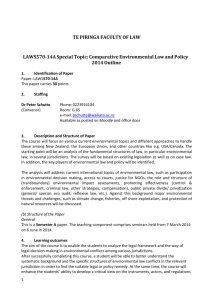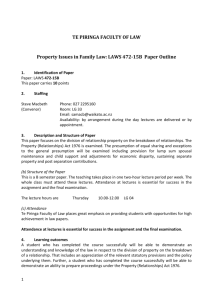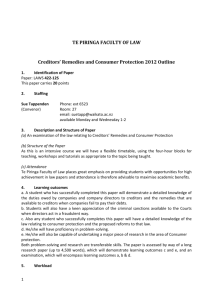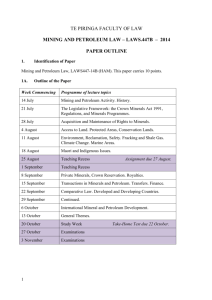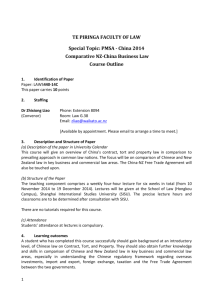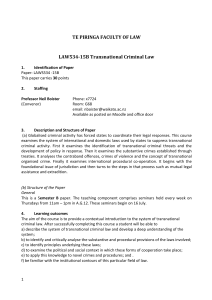LAWS576-14A Law of Armed Conflict and International
advertisement
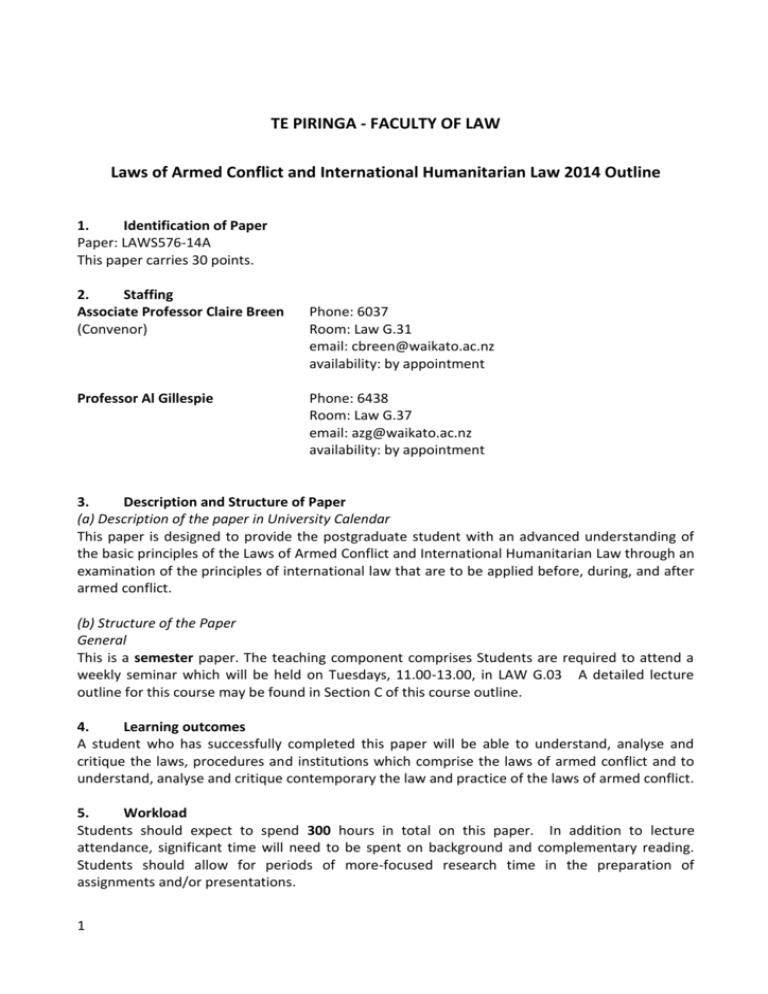
TE PIRINGA - FACULTY OF LAW Laws of Armed Conflict and International Humanitarian Law 2014 Outline 1. Identification of Paper Paper: LAWS576-14A This paper carries 30 points. 2. Staffing Associate Professor Claire Breen (Convenor) Professor Al Gillespie Phone: 6037 Room: Law G.31 email: cbreen@waikato.ac.nz availability: by appointment Phone: 6438 Room: Law G.37 email: azg@waikato.ac.nz availability: by appointment 3. Description and Structure of Paper (a) Description of the paper in University Calendar This paper is designed to provide the postgraduate student with an advanced understanding of the basic principles of the Laws of Armed Conflict and International Humanitarian Law through an examination of the principles of international law that are to be applied before, during, and after armed conflict. (b) Structure of the Paper General This is a semester paper. The teaching component comprises Students are required to attend a weekly seminar which will be held on Tuesdays, 11.00-13.00, in LAW G.03 A detailed lecture outline for this course may be found in Section C of this course outline. 4. Learning outcomes A student who has successfully completed this paper will be able to understand, analyse and critique the laws, procedures and institutions which comprise the laws of armed conflict and to understand, analyse and critique contemporary the law and practice of the laws of armed conflict. 5. Workload Students should expect to spend 300 hours in total on this paper. In addition to lecture attendance, significant time will need to be spent on background and complementary reading. Students should allow for periods of more-focused research time in the preparation of assignments and/or presentations. 1 6. Required and Recommended Reading All law students are required to purchase, for use in all law papers, a copy of McLay, Murray & Orpin, New Zealand Law Style Guide, 2nd edition, Thomson Reuters (2011). This is available from Bennetts, at an approximate price of $37 incl GST. Whilst there is no single recommended text for this paper, the Law Library holds a number of highly relevant textbooks on armed conflict and humanitarian law such as: Detter, The Law of War (2013) Dinstein, War, Aggression and Self-Defence (2011) Dinstein, The Conduct of Hostilities under the alw of International Armed Conflict (2010) Gillespie, A History of the Laws of War (2011) Solis, The Law of Armed Conflict (2010) Sassoli and Bouvier, How Does the Law Protect in War (2006) Chesterman, S, Just War or Just Peace? : humanitarian intervention and international law (2002) Moir, L, The Law of Internal Armed Conflict (2002) Introductory chapters to IHL can be found in International Law texts such as Ian Brownlie, Principles of Public International Law, (8th ed, OUP, Oxford: 2012) D.J. Harris, Cases and Materials on International Law, (7th ed, Thomson/Sweet & Maxwell, London: 2010) R.M.M. Wallace and O. Martin-Ortega, International Law (6th ed, Thomson Reuters, London: 2009) A Cassese, International Law, (2ed OUP: 2005) A Abass International Law: Text Cases and Materials (OUP, Oxford: 2012) Students should also be familiar with the library’s international law journals, e.g., Journal of conflict & security law, International and Comparative Law Quarterly, and the International Commission of Jurists’ Review. The International Review of the Red Cross (available on line) is particularly valuable. Further material may be provided on the paper site on Moodle (http://elearn.waikato.ac.nz), the University of Waikato’s online learning system. Any such material is provided on the following terms: University of Waikato owns the intellectual property rights, including copyright, in and to this site, or has acquired the necessary licenses to display the material on the site. As a student of the Te Piringa - Faculty of Law, you are granted a limited license to use (access, display or print a single copy) the material from the papers in which you are enrolled for the purposes of participating in the paper only, provided the information is not modified. Materials may not under any circumstances be copied, stored, distributed or provided in any form or method whatsoever to any third party. Any other use of the material is prohibited. None of the material may be otherwise reproduced, reformatted, republished or re-disseminated in any manner or form 2 without the prior written consent of University of Waikato. To obtain such consent, please contact the Te Piringa - Faculty of Law. 7. Online support Online support for this paper is provided via Moodle. 8. Assessment a) Requirements for assessed work School procedures for the presentation of course work are set out in the Te Piringa - Faculty of Law Graduate and Postgraduate Handbook which is available from: www.waikato.ac.nz/law/graduate. See also paragraph 12 below on referencing guidelines and plagiarism. An assignment template document including coversheet is available on the Law Student Homepage http://www.waikato.ac.nz/law/student b) c) Coursework: Final Examination Ratio: 100:0 Assessment Components Component Percentage of overall mark Research Proposal Research Project Research Seminar Presentation 20% 70% 10% Due date Monday, 31 March 5pm Friday, 27 June 5pm to be arranged Research Proposal (20%) The research proposal should be 2,000 words in length and comprise: A Topic and Thesis Statement. This sets out in one or two paragraphs the topic you intend to research. The statement should open with the questions and issues which have stimulated your interest in the topic followed by an explanation of why these questions merit the research in the way you propose. The statement should include a tentative thesis statement in which you articulate the propositions upon which your research paper is focused and any conclusions which you anticipate may emerge from your research. An Annotated Structural Outline: this comprises an annotated outline of the structure of the proposed paper broken down into section headings. Under each heading you should provide a short explanation of how this section of the paper relates to the purpose of your research and your argument. Bear in mind the logic of the argument you want to make in support of the conclusion you aim to draw in answering your research questions. An Annotated Bibliography: this comprises an interim bibliography annotating the items of core literature that appear to be relevant to your topic. In some circumstances, additional material will be required, e.g., a timetable for the attainment of different objectives, a section on methodology, or an outline of ethical issues. 3 The research proposal is not binding. Research work inevitably keeps changing, right up to its completion. The process of putting a proposal together verifies that you have found at least one piece of work that appears to be viable, and have begun to think systematically about the issues it raises. You may be required to amend your research proposal to ensure that you are adequately prepared to begin writing your research paper. The criteria involved in marking the proposal include: Clarity of definition of the topic; Logic, clarity and organisational structure of the outline; Relevance of the annotated bibliography and quality of the annotations; Proper use of the New Zealand Law Style Guide. Research Paper (70%) The research paper must be not shorter than 8,500 words and not longer than 9,500 words (including footnotes). In this paper the student must demonstrate the ability to: Engage in a detailed and critical analysis of the law relevant to the topic; Locate the topic in the relevant context(s); Make appropriate comparisons, if relevant; and Identify, discuss and analyse relevant core legal concepts. Research Presentation (10%) Students will be required to make a 15-20 minute presentation (20 minute limit strictly adhered to) on their draft research paper in class and to answer any questions about it (total time for each student presentation is 30 minutes). The presentation should demonstrate that you have responded to comments on your proposal. It should include an outline of the topic, its core questions, your research findings to date, and your argument. d) Handing in, marking time and collection All assignments must be submitted electronically through Moodle (http://elearn.waikato.ac.nz), and include a coversheet. The coversheet template is provided on the Law Student Homepage (http://www.waikato.ac.nz/law/student ). See Te Piringa - Faculty of Law Graduate and Postgraduate Handbook, available at www.waikato.ac.nz/law/graduate. Where practical, it is the policy of Te Piringa - Faculty of Law to return marked work to students within five weeks of submission. If you require assistance with Moodle, or encounter any problems, please contact the Help Desk. You can send a message to Help Desk by using the instant message service in your paper’s Moodle site (from the participants list within the People block). Alternatively, you can email them directly at help@waikato.ac.nz or call 838 4008. e) Measurement of Achievement Achievement in assignments and presentations will be measured in terms of levels of understanding and knowledge gained, in terms of the originality and the sophistication of analysis 4 provided, in terms of coherent and logical structure, and in terms of the fluency and accuracy of expression and referencing. f) Management of assessment deadlines, process for requesting extensions and special consideration, and for appeals i) Extensions Students are required to complete and submit all internal assessment by specified dates. The meeting of deadlines is a mark of professionalism and its enforcement is essential for fairness to all students taking the paper. Handing in course work on or before the due in date also facilitates the timely return of marked work by academic staff. Students should meet requirements as to time deadlines for course work, or make a request for an extension or special consideration in appropriate circumstances (see Graduate Programmes Manual available from the Faculty of Law Graduate website www.waikato.ac.nz/law/graduate/.) Failure to comply with requirements as to the time deadlines for internal assessment without having successfully applied either for an extension or special consideration with supporting evidence before the due date will result in deduction of 2.5 marks for each day the work is late. Lateness of more than a week may result in the work not being marked. No deadlines may be extended beyond two weeks after the last teaching day of the semester(s) in which the paper is taught as final grades must go to the Board of Examiners at this time. Unless an extension in writing has been granted, a lecturer may refuse to accept a piece of work which is submitted after the specified date, and automatically award it no mark, or may lower the mark as a penalty for lateness. Applications for extension, on the form obtainable from the Resource Room, must be submitted to the Chief Examiner or nominee. Students should not submit the extension form to the lecturer, nor should students seek extensions from the lecturer via other forms of communication. Extensions will be granted only on evidence of illness, family bereavement, or serious personal accidents or circumstances. Please note that too many assignments due at the same time is NOT an acceptable reason, neither are claims that computers and/or printers have crashed. Account will be taken of the time in which the student has had to complete the internal assessment before the supervening event occurred. It will be important to consider if the grant of the extension will give the student in question an unfair advantage over other students. A maximum period of 21 days will be given as an extension unless there are exceptional circumstances. In determining applications the Chief Examiner or nominee may consult with the Convenor or lecturer of the relevant paper. When the Chief Examiner or nominee has made a decision on the application for extension, the Resource Room Administrative Assistant will advise the student of the decision by email. Following this, the extension form will be given to the relevant lecturer who will retain it until after the assignment is marked and returned to students. The form will then be placed on the student’s file. It should be noted that if an extension of longer than 14 days is granted, the assignment will not be automatically printed out and delivered to the lecturer, therefore the lecturer is responsible for ensuring the assignment is printed. In appropriate cases, when a student’s application for extension is declined the Chief Examiner or nominee will inform the student of the process for applying for special consideration. 5 ii) Special Consideration The Assessment Regulations 2005 as set out in the University Calendar 2013 list in detail the university-wide policies and procedures, which apply concerning missed examinations, impaired performance or impaired preparation time for an examination, and missed or impaired course work. Students are responsible for ensuring that they comply with these regulations. Application forms for special consideration for internal assessment are available from the Resource Room. iii) Appeals (University Calendar 2013, Assessment Regulations 2005, Reg. 24) A student may appeal against any decision taken under these regulations. An appeal, comprising a written statement of the circumstances of the appeal, together with supporting evidence if available, must be submitted by the student in writing to the Director of Student & Academic Services not more than seven days after the date on which notification of the relevant decision is received. Appeals under this section are considered and decided by the Deputy Vice-Chancellor by delegated authority of the Academic Programmes Committee. A decision by the Deputy Vice-Chancellor is notified in writing, and is final. 9. University Calendar Regulations and Policies Your attention is drawn to the following regulations and policies, which are published in the University Calendar 2014: Assessment Regulations 2005 Student Discipline Regulations 2008 Computer Systems Regulations 2005 Policy on the Use of Māori for Assessment Student Research Regulations 2008 Ethical Conduct in Human Research and Related Activities Regulations 2008. 10. Links to other papers There are clear linkages between this paper and other papers with a focus on Human Rights, International Law, International Criminal Law and Public International Law. 11. Fees Refer to http://calendar.waikato.ac.nz/admission/tableoffeesandcharges.html. 12. (a) (b) 6 Referencing guidelines and caution against plagiarism Referencing must be in accordance with the New Zealand Law Style Guide (2nd Ed) Thomson Reuters 2011. All written work submitted for the purposes of assessment must be your own work. Copying or paraphrasing all or part of another person’s work, be it published or unpublished, without clear attribution, is plagiarism. Plagiarism is misconduct and is dealt with under the disciplinary procedures of the University as outlined in the Student Discipline Regulations 2008 in the University Calendar. “Plagiarism means presenting as one’s own work the work of another, and includes the copying or paraphrasing of another person’s work in an assessment item without acknowledging it as the other person’s work through full and accurate referencing; it applies to assessment presented through a written, spoken, electronic, broadcasting, (c) visual, performance or other medium.” See section 3, Assessment Regulations (2014 Calendar) The Te Piringa - Faculty of Law’s policy regarding plagiarism is contained in the Te Piringa - Faculty of Law Undergraduate Handbook and the Te Piringa - Faculty of Law Undergraduate Programmes Manual, available from www.waikato.ac.nz/law/undergraduate/. 13. Health and safety Information regarding the Law Faculty’s Health and Safety representative will be advised. 14. Class representation At the commencement of the semester, a class representative will be elected by the students in Laws of Armed Conflict. This representative is encouraged to communicate regularly with the Convenor. Students in this paper are encouraged to liaise with their representative to discuss issues of concern. Contact details for the Student Representation Coordinator, Academic Services Division, are as follows: Samantha Whittle, Student Services, ext. 6264, CHSSG.25 email: student.reps@waikato.ac.nz 15. Complaints procedures The brochure Student Concerns and Complaints Policy provides details of the University’s process for handling concerns and complaints and is available from Faculty and School Offices, The Gateway and Student Services Division and is contained in the Calendar 2014. See also the document Student Support Structure at Te Piringa - Faculty of Law, available from the Resource Room. 7 Lecture Schedule Lecture Schedule A Semester Week Commencing Programme of lecture topics 3 Mar Introduction 10 March Combatants 17 March Civilians 24 March Weapons of Mass Destruction 31 March Small Weapons 7 April Internal Armed Conflict 14 April (Good Fri 18 April) Teaching Recess 21 April (Mon 21 Easter Mon, Tues 22 Uni Hol & Fri Teaching Recess 25 Anzac Day) 28 April Humanitarian Law and Human Rights 5 May Responding to Violations of IHL 12 May Peacekeeping 19 May Peace Enforcement 26 May Presentations I 2 June (2 June Queen’s Birthday) Presentations II 9 June Study Week 16 June Examinations 23 June Examinations 30 June Teaching Recess 8
